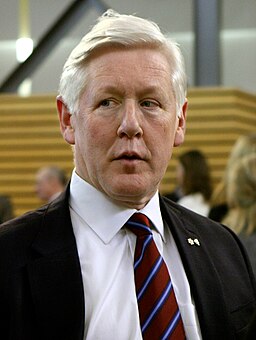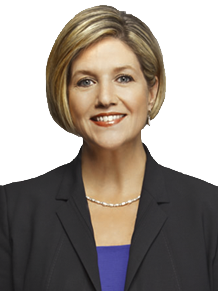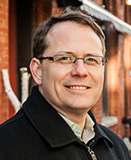The first three leaders of the Liberal Party of Canada were not chosen at a leadership convention. Alexander Mackenzie and Edward Blake were chosen by the party caucus. Wilfrid Laurier was also chosen by caucus members with the party convention of 1893 ratifying his leadership. The most recent leadership election was held in 2013.
The first Progressive Conservative Party of Canada leadership election was held in 1927, when the party was called the Conservative Party. Prior to then the party's leader was chosen by the caucus or in several cases by the Governor General of Canada designating a Conservative MP or Senator to form a government after the retirement or death of an incumbent Conservative Prime Minister.
On January 23, 2004, the Progressive Conservative Party of Ontario leader Ernie Eves announced his intention to step down as leader before the fall of 2004. Eves was elected party leader in the party's 2002 leadership election, and became Premier of Ontario. He led the party to defeat in the 2003 provincial election.

Frank de Jong, is a Canadian politician, environmentalist and elementary school teacher at Fern Avenue Public School. He joined the Green Party of Ontario in 1987 and became the party's first official leader in 1993 – a position he held until November 14, 2009, when he was replaced by Mike Schreiner. He is the current interim leader of the Yukon Green Party.

The 2003 Progressive Conservative leadership election was held on May 31, 2003 to elect a leader of the Progressive Conservative Party of Canada. Peter MacKay was elected as leader to replace former Prime Minister Joe Clark, who had retired as party leader. In the end, five candidates emerged as challengers for the leadership by the convention date. Two other candidates had participated in the race but both withdrew as contestants before the vote. Quebec Member of Parliament (MP) André Bachand withdrew his candidacy from the race due to financial concerns and backed Peter MacKay. Former Cabinet Minister and Quebec MP Heward Grafftey also withdrew his candidacy from the race due to health concerns and backed David Orchard.

The 1967 Progressive Conservative leadership election was held to choose a leader for the Progressive Conservative Party of Canada. The convention was held at Maple Leaf Gardens in Toronto, Ontario, Canada between September 4 and 9, 1967. Robert Stanfield was elected the new leader.
The Alberta Alliance Party, a conservative political party in Alberta, Canada, held its second leadership election on November 18 and 19, 2005, in Red Deer, Alberta. The leadership position was vacated by Alberta Alliance Party founder and leader Randy Thorsteinson in March 2005.

The Liberal Party of Canada leadership election of 2006 was prompted by outgoing Prime Minister Paul Martin's announcement that he would not lead the Liberal Party of Canada into another election, following his party's defeat in the 2006 federal election in Canada. The party's biennial convention, already scheduled to occur from November 29 to December 1, 2006 in Montreal's Palais des congrès, was followed by the party's leadership convention at the same venue occurring December 2 to December 3, 2006. As the winner, Stéphane Dion led the Liberal Party into the 2008 federal election.
As stipulated under the party's current constitution, the Green Party of Canada holds a national leadership election every 4 years.
The Green Party of Canada was founded at a conference held at Carleton University in Ottawa in 1983. Under its first leader, Dr. Trevor Hancock, the party ran 60 candidates in the 1984 Canadian federal election. The BC Greens ran Canada's first Green candidate. Later that year, the founding conference of the Canadian Greens was held at Carleton University in Ottawa, Ontario. Close to 200 people from 55 communities attended, coming from every province except Newfoundland and Labrador and Prince Edward Island.

The 2009 Ontario New Democratic Party leadership election was held in Hamilton, from March 6 to 8, 2009 to elect a successor to Howard Hampton as leader of the Ontario New Democratic Party (NDP). On June 15, 2008, Hampton informed the party's provincial council that he would not stand for re-election as leader at the next party convention in a year's time. While a leadership vote was held at each biennial convention of the Ontario NDP until and including the last regular convention in 2007, there is normally not a contested vote unless there is a vacancy, therefore, the 2009 vote was the party's first leadership convention since Hampton was elected in 1996 to succeed Bob Rae.

On March 6, 2009, Progressive Conservative Party of Ontario leader John Tory announced his intention to step down as leader following his defeat in a by-election. Tory was elected party leader in the party's 2004 leadership election, and led the party to defeat in the 2007 provincial election in which he failed to win personal election to the Ontario Legislature. He attempted again to enter the legislature in a March 5, 2009 by-election but was defeated by the Liberal candidate.

The 2009 Green Party of Ontario leadership election took place November 13–15, 2009 in London, Ontario.
An election for the leadership of the Liberal Party of Canada was triggered by Michael Ignatieff's announcement on May 3, 2011, of his intention to resign as leader following the party's defeat in the 2011 federal election. On May 25, 2011, Bob Rae was appointed by Liberal caucus as interim leader. The party announced Justin Trudeau as its new leader on April 14, 2013, in Ottawa, Ontario.

The 1998 Progressive Conservative leadership election was held on October 24 and November 14, 1998 to choose a successor to Jean Charest. This was the first time the Progressive Conservatives used a one member, one vote system to choose a leader rather than a delegated leadership convention, which has been the norm since 1927. The 1998 election used a point system that allocated 100 points to each riding, regardless of the number of votes cast in the riding. The candidate who won a majority of points would win the leadership. All party members were eligible to cast a vote. If no candidate received a majority of points on the first ballot, the lowest ranking candidate would be automatically eliminated and a second ballot was to be held using a preferential ballot if more than two candidates remained. The 100-point-per-riding system was again used by the Conservative Party of Canada in its 2004 leadership race.




















